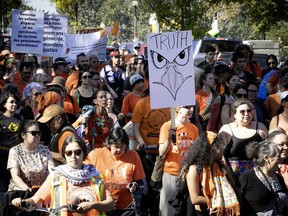People wore orange shirts to remember the victims and survivors of residential schools at events across Canada.

A loud, boisterous sea of orange marched through Montreal to mark the National Day for Truth and Reconciliation, reflecting on the legacy of residential schools and remembering those who survived — and the thousands who didn’t.
The crowd first gathered at the foot of Mount Royal to listen to number of speakers including Indigenous musician Jeremy Dutcher and Kevin Deer, an elder from Kahnawake Mohawk Territory who performed a ceremony to begin the event. They then marched along city streets to another gathering at Place du Canada.
Nakuset, executive director of the Native Women’s Shelter of Montreal and an organizer of the event, said she hoped to see more young people get involved in the movement.
She noted the Truth and Reconciliation Commission report has been around for nearly a decade, but only 11 of the 94 calls to action have been implemented.
“So who’s going to do it if the adults now, the current government, isn’t going to implement them? We’re hoping that next generation is going to do it,” she said. “It’s really hard to get the government to move, and I’m really not patient so, I’m hoping to have people inspired today by these incredible speakers that are going to share knowledge they would not get anywhere else.”
Noella Mckenzie, an Innu elder and residential school survivor, told those gathered that she came for the same reason others did.
“We are stronger together,” Mckenzie said.
“I’m proud today because I spent 10 years in a residential school … I told myself we must always give hope to our kids of the future, so that they know what we’ve experienced.”
More than 150,000 children were forced to attend residential schools, and many survivors detailed the horrific abuse they suffered at the Truth and Reconciliation Commission.
An estimated 6,000 children died while attending the schools, although experts say the actual number could be much higher.
Most in attendance at the Montreal march and similar events elsewhere in Canada wore the orange shirts that have come to be a symbol of reconciliation, inspired by the story of residential school survivor Phyllis Jack Webstad, who has recounted having a brand new orange shirt taken from her on her first day at a residential school and never having it returned.
In Ottawa, the smell of sage and sweetgrass floated in the air over a mostly sombre ceremony, broken up by a few moments of levity and celebration.
While Diyet & the Love Soldiers performed their song We’re Still Here, dignitaries and children alike got up on their feet and started dancing.
Gov. Gen. Mary Simon, her orange T-shirt clearly visible under a black pantsuit, stood clapping in the middle of a circle of people dancing.
Immigration Minister Marc Miller was passed a hand drum by a woman in the crowd and began to play along as House of Commons Speaker Greg Fergus bounced up and down to the beat. At one end of the growing circle a young girl danced holding hands with a woman in a bright orange T-shirt reading “I’m a residential school survivor.”
Crowds gathered on the lawn in front of Centre Block Monday to remember and reflect.
“The residential school system was intended to destroy us, and they did not succeed,” said Stephanie Scott, the executive director of the National Centre for Truth and Reconciliation, to roaring applause.
“Our children suffered in those institutions, and to this day, their spirits call out to all of us to be remembered and honoured.”
In Charlottetown, Premier Dennis King invited the chiefs of the Mi’kmaq First Nations and the public to the Provincial Administration Building for a short reflection followed by lowering the flags to honour the lives of Indigenous Peoples affected by the residential school system. The province also planned to shine orange lights on the building after sunset.
In Fredericton, Amanda Myran Dakota of Wolastoqey First Nation sat with her elders, holding her drum which she would later play at the ceremony there. She said since Truth and Reconciliation Day was created in 2021, “there have been some baby steps, but there is a lot of work that has to happen.”
In Toronto, a crowd gathered at Nathan Phillips Square outside city hall, most wearing orange shirts and traditional Indigenous clothing, as musicians beat drums, a dancer performed and speakers delivered speeches on the stage.
Riscylla Shaw, a grandchild of a residential school survivor, said the residential school system a painful part of not only history but also present-day Canada. “It is a very painful part of the current way of being that so many indigenous communities don’t have fresh water, don’t have access to health resources, education resources, fresh food,” she said. “It also is really meaningful to see so many people here in orange shirts, to see the support.”
In British Columbia, where a provincial election campaign is underway, B.C. Conservative Party Leader John Rustad said if his party were elected the province would partner with First Nations to find prosperity through resource projects. NDP Leader David Eby attended an Orange Shirt Day ceremony at the University of B.C., while Green Leader Sonia Furstenau held a news conference to warn that some of the of the party leaders want to “undo” the progress the province has made on Indigenous rights.
Prime Minister Justin Trudeau travelled to Inuvik, N.W.T. to take part in events there. He was represented in Ottawa by many in his cabinet including Crown-Indigenous Relations Minister Gary Anandasangaree. “It’s a day for enormous reflection,” said Anandasangaree, his words straining to be heard over the heartbeat of the drum playing behind him.
Conservative Leader Pierre Poilievre didn’t attend the event on Parliament Hill, electing to participate in a separate event with Indigenous leaders along with the party’s critic for Crown-Indigenous relations and Indigenous services MP Jamie Schmale.